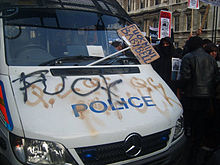UK students protest for second time this month
Wednesday, November 24, 2010

Mass-walkouts took place today in cities throughout the United Kingdom, as students campaigned against rising tuition fees and government cuts.
Protests took place for the second time in as many weeks in places such as Aberystwyth, Cambridge, Southampton, Liverpool, and Brighton. Events included a 'study-in' at the Edinburgh Liberal Democrat headquarters, a 10am protest in Trafalgar Square attended by thousands, and a 'dress in red' march in Manchester.
In Cardiff, at least a hundred students rallied outside the main gates of Cardiff University's main building, in an event organised by a group named Actions Against Cuts Cardiff, with the support of a member of the National Union of Students executive committee. Occupations of university buildings have also begun in Birmingham, Plymouth, and the Royal Holloway.
In London, students are infuriated by what they say is London South Bank University's decision to ban anti-cut related meetings from their campus earlier this month. One student described it as "undemocratic and scandalous" as, according to the students, they were forced out of their booked room by security guards, and prevented from partaking on any on-campus meetings -- but South Bank University maintains that it was a "misunderstanding" due to a double-booked room. Dr. Phil Cardew, Pro Vice-Chancellor of LSBU, maintained that "freedom of speech lies at the very heart of the higher education community whether it is academic, political or social debate", and that "the students were encouraged to continue their discussions in the Students Union".

Not all the demonstrations were peaceful. Central London saw two officers injured as the police attempted to hold back the protesters, a police van attacked and vandalised, and three arrests were made. Police, keen to make sure that the 30 Millbank occupation was not repeated, were out in force, clashing with students in Cambridge, where two arrests were made, and kettling protesters of up to a thousand, according to protest organisers, as dusk approached.
The group that organised the protests, the "National Campaign Against Fees And Cuts" (NCAFAC), told students in the run-up to the protests to not "be afraid of blocking traffic if you have enough people". On their blog, they stated that "[they] would like to see university students planning to march around their campus, bursting into lecture theatres and spreading the word", a move that would breach many University codes of conduct. When contacted by Wikinews, the group did not respond to requests for clarification.
Universities are facing more than £900m ($1.4bn) cuts in the next three years. This protest comes as, earlier this month, 50,000 students and lecturers took to the streets in a National Union of Students organised rally, which culminated in the violent occupation of the Conservative Party campaign headquarters at 30 Millbank. In Westminster, a student suspected of throwing a fire extinguisher off the headquarters' roof pleaded guilty in court today, under the charge of violent disorder, and will appear in Southwark Crown Court at a later date for sentencing, the maximum of which is five years imprisonment. Some protesters involved in the 30 Millbank occupation led an 'energising meeting' in Cardiff yesterday, prior to today's demonstration.
Many students do not understand the reasoning behind the cuts. The Trotskyist student group, Cardiff University Socialist Students, wonder why, compared to the "£120 billion the government throws away every year on evaded, avoided and uncollected taxes", the "few billion" required to pay tuition fees is "tiny". The group also advocates cutting the Trident nuclear deterrent in order to pay for fees, and wonder why the vice-chancellor of the university was awarded a 4% pay rise (to £275k p.a.) compared to last year, whilst during the economic recession.
Last week, three hundred sixth-formers marched in Finchley, Margaret Thatcher's old constituency, throwing shirts at the local Tory headquarters, echoing the phrase "They ripped the shirts of our backs". Lower income college students are hit badly by the budget cuts, as plans to abolish Educational Maintenance Allowance (EMA), the up-to £30 a week subsidy for 16-19 year-old full-time students with household incomes of £30,810 or less.
The protests were primarily organised on the popular social networking site, Facebook. One Facebook user said earlier this week that the protests were "a perfect opportunity for students to show how disappointed we are with Nick Clegg", who was advised by security officers earlier to desist from cycling from his home in Putney to Downing Street over fears that he could be pounced upon by angry students en route.
Related news
- "London fire extinguisher throw suspect bailed" — Wikinews, November 17, 2010
Sources
- "EMA: how much, and how often?" — DirectGov, November 24, 2010
- Andy Bloxham. "Tuition fee protests: eight injured, five arrested as students turn violent" — The Daily Telegraph, November 24, 2010
- Sean Coughlan. "Police lines hold back student tuition fee protesters" — BBC News Online, November 24, 2010
- "Student fee protester admits throwing fire extinguisher" — BBC News Online, November 24, 2010
- Rosa Prince. "Nick Clegg warned to stop cycling over security threat from angry students" — The Daily Telegraph, November 24, 2010
- Mark L. Thomas. "Barnet sixth formers march on local Tory HQ" — Socialist Worker Online, November 20, 2010
- "Statement condemning LSBU’s suppression of Defend LSBU! Defend our Education! on campus" — November 18, 2010
- Martin Shipton. "Top academics’ pay rises by university" — WalesOnline, March 31, 2010
- "Top UK universities warn of damage from budget cuts" — BBC News Online, January 15, 2010
- November 24, 2010
- Original reporting
- Published
- Archived
- Politics and conflicts
- Economy and business
- Education
- Europe
- United Kingdom
- England
- Wales
- Cardiff, Wales
- Nick Clegg
- Liverpool
- Southampton
- London
- University of Cardiff
- Downing Street
- Nuclear technology
- Nuclear weapons
- Cambridge, England
- Trident (nuclear weapon)
- Aberystwyth



